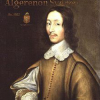Algernon Sidney

Algernon Sidney
Algernon Sidney or Sydneywas an English politician and member of the Long Parliament. A republican political theorist, colonel, and commissioner of the trial of King Charles I of England, he opposed the king's execution. Sidney was later charged with plotting against Charles II, in part based on his work, Discourses Concerning Government, used by the prosecution as a witness at his trial. He was executed for treason. After his death, Sidney was revered as a "Whig patriot–hero and martyr"...
NationalityEnglish
ProfessionPolitician
Date of Birth14 January 1653
That is the best Government, which best provides for war.
We cannot distinguish truth from falsehood, right from wrong, or know what obedience we owe to the magistrate, or what we may justly expect from him, unless we know what he is, why he is, and by whom he is made to be what he is.... I cannot know how to obey unless I know in what, and to whom; nor in what unless I know what ought to be commanded; nor what ought to be commanded unless I understand the original right of the commander, which is the great arcanum.
God leaves to Man the choice of Forms in Government; and those who constitute one Form, may abrogate it.
Laws and constitutions ought to be weighed... to constitute that which is most conducing to the establishment of justice and liberty.
Many things are unknown to the wisest, and the best men can never wholly divest themselves of passions and affections... nothing can or ought to be permanent but that which is perfect.
There may be a hundred thousand men in an army, who are all equally free; but they only are naturally most fit to be commanders or leaders, who most excel in the virtues required for the right performance of those offices.
Liars need to have good memories.
That which is not just, is not Law; and that which is not Law, ought not to be obeyed.
Everyone sees they cannot well live asunder, nor many together, without some rule to which all must submit.
If the public safety be provided, liberty and propriety secured, justice administered, virtue encouraged, vice suppressed, and the true interest of the nation advanced, the ends of government are accomplished . . .
If his Majesty is resolved to have my head, he may make a whistle of my arse if he pleases.
Swords were given to men, that none might be Slaves, but such as know not how to use them.
[L]iberty cannot be preserved, if the manners of the people are corrupted . . .
[A]ll popular and well-mixed governments [republics] . . . are ever established by wise and good men, and can never be upheld otherwise than by virtue: The worst men always conspiring against them, they must fall, if the best have not power to preserve them. . . . [and] unless they be preserved in a great measure free from vices . . . .